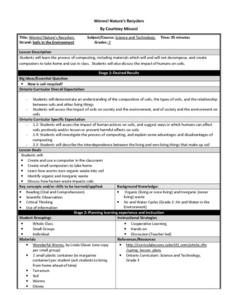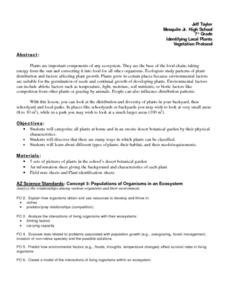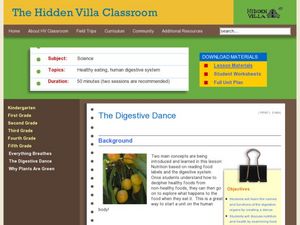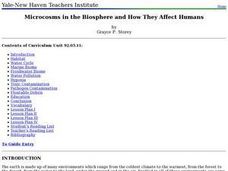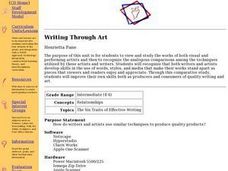Chicago Botanic Garden
Plant Phenology Data Analysis
Beginning in 1851, Thoreau recorded the dates of the first spring blooms in Concord, and this data is helping scientists analyze climate change! The culminating instructional activity in the series of four has pupils graph and analyze...
Chicago Botanic Garden
Calculating Your Carbon Footprint
Unplugging from technology for one day per week will decrease your carbon footprint—are you up to the challenge? Part two in a series of three allows individuals to explore their personal carbon footprints. By first taking a quiz at home...
Chicago Botanic Garden
Preparing for Project BudBurst
Male deer growing antlers to begin the breeding season is an example of a phenological event. First in a four-part series is an activity requiring individuals to collect phenological data on their campus. Classes discuss phenology, the...
Chicago Botanic Garden
The Carbon Cycle
There is 30 percent more carbon in the atmosphere today than there was 150 years ago. The first lesson in the four-part series teaches classes about the carbon cycle. Over two to three days, classes make a model of the cycle,...
Chicago Botanic Garden
Calculating Your Ecological Footprint
You can lower your ecological footprint by recycling! Lesson four in this series of five has individuals, through the use of a computer, calculate their ecological footprints. Through discussions and analysis they determine how many...
Chicago Botanic Garden
Are All Plants Created Equal?
Photosynthesis requires energy and produces food, and cellular respiration produces energy and requires food. An interesting lesson analyzes the factors that affect the rates of photosynthesis and respiration. Classes spend one day...
Curated OER
Brine Shrimp Anatomy
Third graders investigate the anatomy of the brine shrimp. They construct a model of the shrimp to demonstrate the anatomical parts of the shrimp. Students research the different factors that contribute to shrimp survival. Then they...
Curated OER
Butterfly 2: A Butterfly's Home
Students determine which environmental characteristics make up a favorable butterfly habitat.
Curated OER
Worms, Nature's Recyclers!
Learners study what worms need to survive in different environments. They study how worm composting improves soil and reduce waste. They discuss composting techniques and present a puppet show about a worm's life.
Curated OER
U.S. History: Antebellum Heroes and Villains
Eighth graders research and write reports on key figures of the Antebellum Period. The projects also include pictures, bibliographies, and timelines about their assigned figure. In addition, 8th graders present oral reports to classmates.
Curated OER
F.B.I.
Students create a worm bin full of fruit and vegetable scraps wit paper and observe what happens over time. In this decomposers lesson plan, students observe that the fruit and vegetable scraps become new soil.
Curated OER
The Digestive Dance
Learners read food labels to compare healthy verses non healthy food and then use diagrams to create a poster of the digestive system. In this food lesson plan, students move the food down the digestive track along the digestive system.
Curated OER
Science: Microcosms in the Biosphere
In a series of lessons, examine the impact on humans by microcosms in the biosphere. Among the plans structured for students with different abilities and learning styles, are activities describing the symbiotic relationship, drawing the...
Curated OER
Butterfly 1: Observing the Life Cycle of a Butterfly
Students observe and identify the characteristics of the life cycle of a butterfly.
Curated OER
Pornography Debate
Present your seniors with a controversial topic while studying the first amendment: pornography. This multi-layer resource has scholars writing a pros and cons research paper. They also attend a city council meeting to prepare for an...
Curated OER
Red Wigglers
Students are introduced to the benefits of using Red Wiggler worms to produce compost. They identify the requirements for the worms and the methods to follow in order to produce compost. They draw a picture of a functioning worm bin.
Curated OER
Birds, Birds, Birds
Students explore one bird a day and eventually put together a book about each of the birds they learn.
Curated OER
Prairie In A Bottle
Second graders observe images of prairie ecosystems and discuss the needs of living things. They create a prairie habitat in a closed jar to observe the water cycle and plant growth.
Curated OER
Writing Through Art
Examine the works of visual and performing artists with upper graders. Using the works, they identify the comparisons among the techniques used. They will also review the six traits of effective writing and keep a writing journal...
Curated OER
Genetically Modified Foods in Perspective
Students research the concept of genetically modified foods. The purpose of the research is to increase science content knowledge and comprehension of the controversy surrounding the subject.
Curated OER
Slash Trash! Reducing, Reusing and Recycling Our Way to Zero Waste
The other "Three Rs" are covered in this lesson: reduce, reuse, and recycle. Over four weeks, conservationists collect data about waste in their own homes. They combine their findings with those of other students in order to analyze...
Curated OER
What Is the Nature of Science?
Young scholars distinguish between scientific and everyday meanings of key words-theory, hypothesis, law, fact-and use in context. They recognize the variables that affect observation, data collection, and interpretation. They discover...
Curated OER
Mulch
High schoolers conduct a series of experiments on mulching. In this earth science lesson, students discuss the benefits of mulching on soil. They explore how different types of mulch affect plant growth.
Curated OER
Insects Are Helpful!
Students see that insects do lots good and are very valuable to humans and nature. This is part of an ongoing effort to dispel fears of insects. They rotate through a series of centers that have examples of how insects contribute to our...








